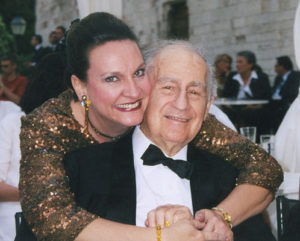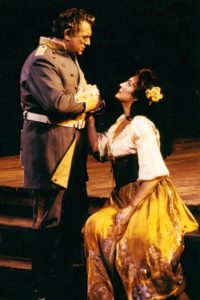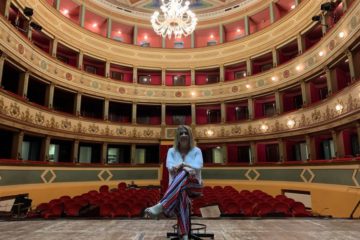Victoria Livengood is a titan of opera: she has sung the title role of Carmen over 250 times on the great stages of the world; she is a Grammy award-winning Metropolitan Opera star; she has over 100 active students; and she is still as miraculous on stage as she was (if not more so) when she began her career over three decades ago. It’s the stuff of opera legends. So what’s the key to her success? According to Victoria, “knowing when to say ‘no’ and to constantly challenge and reinvent yourself.” No one knows how to do that better than the “Dixie Diva,” who will be playing the role of the Mother in Chicago Opera Theater’s production of Gian Carlo Menotti’s The Consul, opening November 4th. Despite her insanely busy schedule, Victoria was gracious enough to take some time to answer a few of my questions about the role, her career, and her love of opera.
Tell us a bit about The Consul, an opera many seasoned operagoers may not be familiar with. Have you performed in this work before? How does your approach to a new role differ from that toward a role you’ve performed before?

Victoria Livengood pictured with The Consul composer Gian Carlo Menotti
I find that with all of the operas written by Menotti, there is a sense of them being cross over pieces in a way. Many of his operas had highly successful Broadway runs, as did The Consul, which may have actually kept opera companies from considering them as more main stream. But for me, they offer something for absolutely everyone. They offer the intrigue and suspense of a great film noir. They have such fully drawn characters, right down to the smallest role and unfold an incredibly intense and dramatic story. I find Menotti’s words to be so poetic and poignant. His operas have the most luscious orchestrations that are hugely romantic and there are melodies that leave a haunting imprint on your mind, once the curtain comes down. I have also believed that The Consul, in particular, should be considered mainstream with opera companies. I mean it won the Pulitzer Prize for music, for goodness’ sake. As a young singer, I was fortunate enough to audition for Gian Carlo Menotti in New York City and he hired me on the spot to sing the role of the Secretary in The Consul for his Spoleto Festival in Italy in the summer of 1998. That production was also recorded live on the Chandos label, with Menotti, himself, directing. It was such a magical summer and the cast has remained lifelong friends. Then, he asked me to go with him for a production that he would direct at the Teatro Colon in Buenos Aires and that was an absolute thrill to perform this piece there with him as well. Then, much later in my career, Florida Grand Opera asked me to take on the role of the Mother in their production and now, I just finished performing that role again with the Long Beach Opera and of course, will make my debut with Chicago Opera Theater in that role. I would be very hard pressed to say which of these two amazing roles I prefer because each role has glorious music to sing and a multi faceted character to bring to life. The Secretary will always remain one of my favorite roles of my career, especially as an actress, but in terms of just singing glorious music, I probably would have to say that at this stage of my career, I adore singing the Mother with its glorious lower register requirements. It’s the only opera in which I get to sing a low F. It is a full circle moment for me because when I first went to college at UNC-Chapel Hill, and I took my first ever voice lesson, that was the very first aria that I was given to learn, the Lullaby from The Consul. When I came home from college after a few months, having changed my major from pre-law to vocal performance, I sang that aria for my parents and Daddy took out his checkbook and the rest is history. LOL.
There are so many people whose lives are altered by travel bans and immigration laws and whose lives depend on bureaucratic decisions.
How does the story of The Consul, an opera composed in 1950, resonate with today’s audience?

Victoria Livengood
This story and this conflict is one that is just as prevalent and important today as it was when Menotti composed it in 1950. That is the sad reality. He actually set it during the Cold War but he set it in an unknown place and time period which makes it much more accessible for modern times. When we performed it in Buenos Aires in the late 90’s, it was a very heated subject matter and it is still a hot topic today. There are so many people whose lives are altered by travel bans and immigration laws and whose lives depend on bureaucratic decisions.
What is your favorite scene in this production?
That’s very hard to choose just one. I truly love this entire piece. Because I have such history with the piece, I always just light up when it’s time to sing the lullaby to the baby, to be sure. I sing it to my little three-month-old great nephew, too. But, having come from a family of barbershop singers (my parents were each in championship quartets) and growing up on a cappella and harmonies, I adore singing the trio with Magda and John. We have this glorious moment where our voices lock in together as we say goodbye and I always find that an emotional charge.
It’s such a rush when you can fully inhabit a character and I always try to find qualities of my own life and journey to bring to each role.
One of the things that distinguishes you is the fact that you’re not only a great singer, but also a fantastic actress. With so much of the emphasis in opera on singing, how have you developed your skills as an actress?
Well, thank you for that because I think the most important part of my job as an artist and singer is to be a storyteller. Making people feel something is my number one goal. I will often sacrifice striving for vocal perfection in place of communicating an honest story (don’t tell my students I said that – Hahahaha). One of my mentors, John Moriarty, discovered me during a master class in NC [North Carolina]. He brought me to the Boston Conservatory to do my Master’s and that is when I began really honing my craft in terms of acting. He helped me take the enormous amount of energy I have and channel it and wrangle it into an intensity and power. It’s such a rush when you can fully inhabit a character and I always try to find qualities of my own life and journey to bring to each role. Instead of pretending to be someone else, I find my own reality and history to bring to each character.
I stopped subscribing to opera magazines early in my career because they made me feel bad about the jobs I wasn’t getting instead of grateful for the jobs I was getting.
The opera world is known for its competitiveness, but you have established and maintained a strong career for decades. What advice do you have for budding singer-actor/actresses?
You do YOU is what I always tell my students. Be true to yourself. Only compete with yourself. I stopped subscribing to opera magazines early in my career because they made me feel bad about the jobs I wasn’t getting instead of grateful for the jobs I was getting. I tell my students that our goal is to help them to reach their full potential and to find their own unique qualities as a singer. I can honestly say that out of the nearly 100 students that I work with, teaching them all the same techniques, no two sound alike. Having made my debut in 1984, I am now enjoying my 33rd year on this roller coaster ride and I feel that the key to that longevity is knowing when to say NO and to constantly challenging and reinventing yourself. When I chose to retire my signature role of Carmen and move into an entirely new repertoire, that opened up another career with a plethora of amazing new roles to tackle and I am loving every minute of it. You have to look at the big picture and pace a career. I started with the French mezzo repertoire and waited until I was over 40 to take on the Verdi and the Wagner roles and then over 50 to dive into the character mezzo pool. I get to do a much bigger variety of operas now, from comedies like Gilbert and Sullivan to modern and contemporary pieces like playing the role of Julia Child to the hags and the witches. There is never a dull moment.

Victoria Livengood as Carmen, opposite Placido Domingo
Of all the roles you’ve played in all the productions you’ve been in over the years, which one stands out?
When you have performed the role of Carmen over 250 times, there is no way that productions of that would not be your standouts. I have no other role that I have that kind of history with. A definite highlight of my career was when I was actually singing the role of Carmen in Cologne, Germany, and the Met called and told me that I would be performing it at the Met, having covered it there numerous times. My parents chartered a plane and brought a few hundred Tar Heels [a nickname for people from North Carolina] up to NYC for that momentous event. I experienced a joy and celebration in my performance that night like no other and bowing in front of my family and friends, I felt like I could quit right then and there with no regrets. It was four hours of heaven.
The key to my life these days is finding the balance between life on the road, performing, teaching and quality time with my family. It’s a constant challenge.
When you’re not singing on the great stages of the world, how do you like to spend your time?
Well, I could tell you what I wish I could be doing when I am not performing and that would be lounging at the beach or enjoying the art of photography which is a hobby, but the truth is that most of the time that I am not on the road, I am teaching and paying it forward. I absolutely love it and it is another full time job for me, alongside learning all of these new roles, traveling and performing. I adore my students and they inspire me on a daily basis. The key to my life these days is finding the balance between life on the road, performing, teaching and quality time with my family. It’s a constant challenge.
The obvious alliteration inspired a journalist to do an article called the “Dixie Diva” and of course, it stuck like glue. I ordered a license plate the next day.
Tell us a bit about your nickname, the “Dixie Diva.” Where did that name come from?
Well, coming from a cow farm in the little town of Thomasville, North Carolina and having a very thick Southern drawl certainly contributed to it. The obvious alliteration inspired a journalist to do an article called the “Dixie Diva” and of course, it stuck like glue. I ordered a license plate the next day. LOL.

Victoria Livengood in The Ghosts of Versailles with LA Opera. This is a Grammy award-winning recording.
To finish, I’d like to ask a question I ask everyone: what is it about opera that touches your soul?
Growing up on a farm, I never saw or heard an opera until I went to college. Then, I went to school to become a lawyer, auditioned for the choir and discovered my true calling. We went to see La bohème and when I saw that opera was an art form that combined all of my passions into one powerful genre, it was like a lightening bolt struck me that this was my destiny. It allows me to sing, to act, to play dress up, to dance, to embrace foreign languages, to be creative, to challenge myself, to travel the world, to meet new people and hopefully to inspire others along the way. I love the saying about when you do what you love, you never work a day in your life. I work very hard, to be sure, but it always feels like I am that little girl, still playing dress up and singing into her hair brush, only now I do it in front of thousands of people and I get paid. What could be more awesome than that?
Featured photo: Victoria Livengood receiving accolades following a Met performance as Carmen, with her friends and family in the audience.


